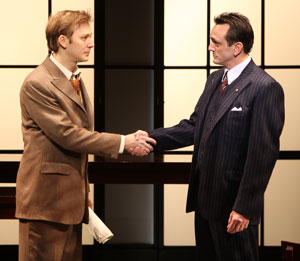By Lucy Komisar
Inter Press Service (IPS), March 19, 2008
It’s not surprising that ethics — or more precisely, a lack thereof — has taken centre stage during this New York theatre season. Playwrights have trained their sights on the morally challenged West, hoping perhaps to get theatregoers to muse on the connections between public and private evil.
Broadway dissects corporate ethics in The Farnsworth Invention, political wrongdoing in November and personal morals in The Seafarer.
Anyone who has watched television would be fascinated by the story of its creation — and of its theft. Philo Farnsworth (played by Jimmi Simpson), whose life is told in The Farnsworth Invention by Aaron Sorkin, was a genius inventor who grew up in Idaho, in the middle of the corn belt, in the 1920s. When Philo was 12, he invented the car ignition lock, and then he went to work to invent television.
Meanwhile, in New York, a Russian immigrant named David Sarnoff (Hank Azaria), who had escaped the pogroms of the turn of the last century, was starting his corporate empire with radio through the Radio Corporation of America and then the National Broadcasting Company, NBC, which he established in 1926.
Sarnoff and Farnsworth both had a vision of moving voices and pictures into a box in peoples’ homes. Tele meant far, from the Greek. The key to television was the vacuum cathode ray tube, which Farnsworth created in 1927. Sarnoff’s engineers included a Russian, Vladimir Zworykin (Bruce McKenzie), who had fled Soviet communism. He had devised a way to focus light, crucially needed to make the system work, but he didn’t have the cathode ray tube. Farnsworth knew of Zworykin’s work and, imbued with the love of science and discovery, was excited to discuss and share his own progress. So Sarnoff sent Zworykin to steal Farnsworth’s discovery.
Zworykin took careful notes and combined it with his own device to create a working television. Farnsworth had a legal patent on the cathode ray tube and would spend 17 fruitless years in legal suits to get fair payments. But he was crushed by NBC’s law firms. At 49, Farnsworth was hospitalised for depression, and he died drunk and broke, in obscurity.
Corporate morality is defined by Sarnoff as defensive thievery. He muses, I don’t think I stole TV. If I did, I stole it fair and square. I burned his house down, so he wouldn’t burn mine down first. On stage, when Sarnoff, in his blue pinstripe suit, declares that television is going to end ignorance and misunderstanding, the audience laughs derisively. Corporate TV ends as it started, corruptly.
Sorkin writes TV serials, and the play resembles a television melodrama, but it’s an important contribution to little known corporate history. NBC is now owned by the global giants General Electric and Vivendi.
In the United States’ current political season, and following the ruinous rule of a man renowned for mendacity, ethics is even more on the front burner than usual. David Mamet’s November makes a stab at outrageous political humor, but his punch lines can’t get more extreme than the truth.
The President (Nathan Lane as a rotund shouter) is in the Oval Office. He is venal and incompetent in a way that obviously reminds you of the present occupant. His hollowed-out world globe is a beer cooler.
 An aide (Dylan Baker) tells him, You’re the ruler of the free world, and he responds, Who can we shake down? What payoffs can we demand?
An aide (Dylan Baker) tells him, You’re the ruler of the free world, and he responds, Who can we shake down? What payoffs can we demand?
His United States is also at war with Iraq, and he is thinking of attacking Iran. When the Iranian government phones, he ignores the call.
He threatens to send people out on the piggy plane, a craft painted with a pig’s face, which carries out renditions. Asked, How is it not breaking the law to torture people? he replies that it’s murder in the service of a higher law.
The President’s campaign is in the doldrums. He inquires of his aide, What is it about me people don’t like? The answer: That you’re still here. And the President’s response: Raise the panic level.
How can one do satire when it is so close to the truth that the only invention here is the pig’s snout on the rendition plane? Nevertheless, what ought to be clever satire is closer to unsubtle late night TV skits and monologues. Still, the audience votes with laughter, almost in relief.
Of course, personal ethics lies at the foundation of the corporate and political variety, and Irish playwright Conor McPherson sets that out in The Seafarer, a parable of how people who commit immoral acts are in danger of losing their souls. It was first staged in London by the National Theatre.
One snowy Christmas Eve in a poor Irish town, Sharky Harkin (David Morse) has come home to visit his blind brother, Richard (Jim Norton), who is egregiously nasty to him. They’re going to spend the evening with a friend, Ivan (Conleth Hill), who ought to be home with his wife and kids, but is usually drunk and always irresponsible. Ivan has a secret about a fire that started in a hotel he was painting.
Into the shabby house comes an acquaintance, Nicky (Sean Mahon), with a curt well-dressed gentleman, Mr. Lockhart (Ciar¡n Hinds), who is a card shark.
Lockhart will reveal that Sharky has a secret, too. Some 25 years ago, Sharky got into a fight with a man, killed him and was jailed. But Lockhart appeared for a hand of poker, and Sharky, curiously, won his freedom. Now the devilish man in the brown vested suit and red tie has come for a rematch. He says, You promised we’d play again. We are going to play for your soul, and I am going to win. In a chilling monologue, he describes how Sharky will go to Hell, an icy place of self loathing, without love.
fight with a man, killed him and was jailed. But Lockhart appeared for a hand of poker, and Sharky, curiously, won his freedom. Now the devilish man in the brown vested suit and red tie has come for a rematch. He says, You promised we’d play again. We are going to play for your soul, and I am going to win. In a chilling monologue, he describes how Sharky will go to Hell, an icy place of self loathing, without love.
Is that where Sharky will go? Or will he and the others be saved by singing Ave Maria? Certainly, it’s a canon of some religions that personal immorality can be expunged through religious devotion, though playwright McPherson rejected his own Catholic faith as a teenager.
What about corporate or political immorality? What about Sarnoff and NBC? Or the President? Those villains don’t suffer remorse or even admit they’ve done wrong. With institutionalised immorality, there’s apparently no need for personal redemption.

